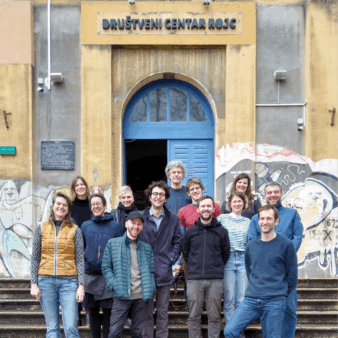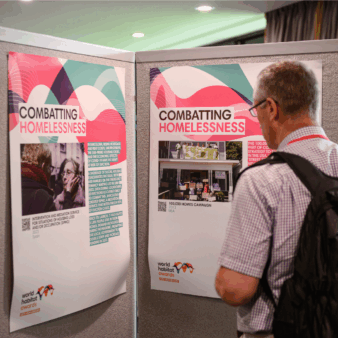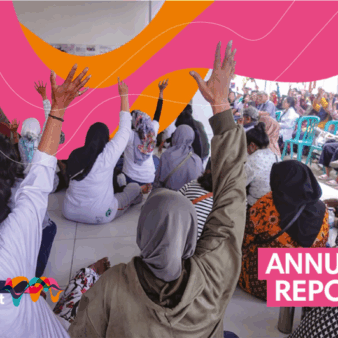
This month, Patricia Latorre, Head of Communications at World Habitat, caught up with Vera Kovacs, the co-founder and chair of From Streets to Homes Association and Director of the City of Budapest’s new social housing agency, and Bálint Misetics Senior Advisor to the Mayor on Housing and Social Policy at the Municipality of Budapest.
They spoke about the systemic causes of homelessness in Hungary, how the current housing policy in Budapest differs from national policy, the need for more compassionate approaches, and the challenges and opportunities for those aiming to create a more equitable housing landscape.
Patricia: Can you both describe the problem with the mainstream approach to homelessness in Hungary?
Vera: The concept of helping people exit homelessness or ending homelessness is completely missing from our system here in Hungary, where people are simply treated as ‘homeless’, with no clear path out. They are excluded from society. The focus is on temporary solutions rather than long-term ones that would have a lasting impact. From Streets to Homes Association (FSTHA) believes that ending homelessness is possible, by addressing systemic causes as well as supporting the individual. We need policy change, to enable people to move out of homelessness and integrate them back into society.
Bálint: I agree. The approach in Hungary stems from entrenched misconceptions about homelessness. Whilst there have been some advances, unfortunately the dominant understanding of homelessness is still that it is caused by some combination of misfortune, personal failures and family dissolution, and the appropriate policy response consists in some sort of – often paternalistic – charitable social service, the provision of shelters, soup kitchens and outreach. But homelessness can’t be substantially and sustainably reduced by charity, shelters, isolated and small-scale “innovative projects” or even just by municipal policies alone. Homelessness is a manifestation of poverty and social inequalities, a structural problem which involves housing policy, the tax system, social security, family policies, land regulation, etc.
The Municipality of Budapest hopes to demonstrate that focusing on prevention and the provision of affordable housing is not only theoretically desirable but also a feasible and effective approach to decreasing homelessness.
Patricia: Why should politicians in Hungary and elsewhere care about homelessness? It’s not usually a big election issue.
Vera: FSTHA has been working on this issue for more than a decade and has seen public awareness of homelessness grow during that time. The result of our and other housing organisations’ efforts is that nowadays, it’s difficult for politicians to avoid addressing housing and homelessness in their campaigns.
Bálint: From the Municipality’s point of view, we are focussing on tackling homelessness because someone needs to. Homelessness is one of the most severe forms of poverty and social exclusion, with a multitude of detrimental effects on one’s quality of life, security, health and longevity, and dignity. Our societies are supposed to be built on the idea of a community of citizens of equal worth. Homelessness is an outright insult to this idea. We believe that we need to reform our understanding of, and responses to, homelessness. With the election of a new city administration at the end of 2019, we had the opportunity to act on this need.
Vera: Another reason I think is that the housing market is becoming more expensive – for everyone – which has also made the issue more visible. Housing is a public good, and people who work and contribute to the city should be able to afford to live there. But in many cities, citizens are being priced out due to investors, or the financialization of housing, and more people are in danger of becoming homeless.
Sadly, in Hungary, political and business interests often take priority over human rights. So, for example, whilst there is more awareness of the link between homelessness and the investment/profit view of housing (i.e. the financialization of housing) we are a long way from tackling it as a human rights issue through policies and laws.
But things are changing slowly. Budapest’s leadership now views housing as a human right, and is trying to supply housing more fairly, which is an entirely new concept in Hungary. However, the overarching system still desperately needs reform.
Patricia: Can you tell us about the new social housing agency and how the Municipality went about involving FSTHA and other stakeholders?
Vera: FSTHA has long been a leading advocate for the social housing agency model in Hungary. We deliver other housing programs and have developed strong partnerships, so we are known as regional experts. FSTHA worked in partnership with the Municipality to develop a good practice guide for creating a municipal social housing agency, which was published in 2021. Funded by the European Social Catalyst Fund, the guide helped pave the way for Budapest’s own social housing agency, although the launch of the agency itself was delayed due to COVID and the war in Ukraine. Some District Municipalities of Budapest have also created their own social housing agencies. FSTHA itself isn’t involved in managing the agency and receives no direct funding from it. The arrangement is that I am on secondment to the Municipality to help get the agency started, using the knowledge and experience that I gained through my work at FSTHA.
Bálint: In Budapest, most services for people who are homeless are provided by non-governmental organisations (NGOs) so for us, cross-sector collaboration is essential. When we created the Municipality’s new strategy on homelessness, we had a golden opportunity to involve homeless citizens as well as professionals and NGOs, and learn about their experiences, grievances, recommendations and expectations. On an ongoing basis, we also make use of forums where the Municipality’s homelessness policies can be discussed and debated with civil society organisations.
While the Municipality itself provides some services, it also supports district local authorities and NGOs through the Metropolitan Solidarity Fund. This provides grants for housing-led programs as well as for other key areas of social policy. FSTHA has been a recipient of funds both in the 2022 and the 2023 rounds of the grant scheme.
Patricia: World Habitat partnered with FSTHA and other homelessness stakeholders last year to research a transition to a housing-led system in Central and Eastern Europe.
The study found that the biggest challenge for this to happen is the lack of affordable and social housing. What is Budapest doing to address this issue?
Bálint: We are starting from the principle that homelessness is, first and foremost, a housing affordability issue. The lack of housing is the only common feature of the otherwise diverse homeless population.
Vera: Housing is the place to start, but there is not a one size fits all solution for every single person. Providing someone with a home can potentially end their homelessness, but others will need social work support and an individualised care plan to get them out of homelessness for the long-term. This is the Housing First approach which needs more attention and backing at a national level.
Bálint: There are of course formerly homeless tenants who would also need a variety of additional services – but the same is true for other segments of the population. The vast majority of those who receive – or would benefit from receiving – social work support, mental health or addiction services, employment services etc. are not homeless, were never homeless, and will not become homeless. This is not what differentiates those who are homeless and those who are not, but whether they have access to housing. This should be emphasised because many people still see providing affordable housing to those who are homeless as a somewhat suspicious — perhaps too radical, perhaps too generous, but in any case, impractical — policy stance. There is still a lot of work to be done to make this proposition as common sense as it should be.
Vera: Yes. Along with agreeing the policy, there is also the practical problem of implementation: If there are not enough homes available then you need to generate more housing units. That is why the Municipality is looking at innovative ways to acquire properties, like vacant buildings, using EU funding to renovate municipal flats and houses, and potentially even reshape abandoned schools or industrial buildings.
Bálint: We are also working on an extensive housing voucher (rent-subsidy) scheme specifically for homeless households, to make housing more affordable and increase access to the private market. I think this could be inspiring to other cities in the Central and Eastern Europe (CEE) region as well.
Patricia: What are the innovative aspects of the Municipality’s approach?
Vera: I think that it is important that the City of Budapest now recognises housing as a human right and homelessness as a solvable problem. This is a precondition to start working on any solutions. Budapest now has many important project ideas beyond the housing agency and plans to introduce larger scale housing allowance programs too, which I am very eager to see. I am happy that the city now tries to distribute its flats in a more equitable way, and homeless people are eligible to apply and prioritised when applying, which is unfortunately not common at all among Hungarian municipalities.
Bálint: Unfortunately, it is indeed unusual to see a Municipality prioritise the reduction of homelessness when allocating its public housing stock, as is the case with Budapest. In fact, if all district authorities had pursued similar policies in recent years, every single homeless person in Budapest could have been given the opportunity to exit homelessness. But sadly, this is not the case.
Also, the way our approach tries to include people who are homeless in forming and delivering the new strategy is innovative in Hungary and is something that other cities could learn from.
Vera: I would like to see us continue to innovate on the provision of social care and support. In many cases, homelessness can be addressed by providing affordable homes, but there are many people out there who need a variety of services which we should provide. We must shift to a system based on individual needs, both in terms of housing and other care needs, that may vary from household to household. Housing is of key importance and enough for many, but not all. The way to end homelessness is not simply to create a housing management company, but affordable housing plus necessary support services and social work. Shelters typically offer a limited range of care services, such as counselling, regardless of whether someone needs them or not. This one-size-fits-all approach contrasts with a system focused on transitioning the individual out of homelessness entirely.
Patricia: Are there any homelessness practices and policies elsewhere in Europe that inspire you?
Bálint: I think that the UK’s “statutory homelessness” legislation, especially how it has been extended in Scotland is an extremely valuable experiment in realising the right to housing and making it enforceable. I read a lot about how it has been hard to put this legislation into practice, but I still think that it’s a very inspiring achievement, and I’m puzzled that it hasn’t gained more attention in international policy discourse on homelessness.
Vera: There is so much good practice happening around us and becoming a World Habitat’s European End Street Homelessness Campaign partner opened a lot of doors to this. Through the programme, we were taken on study trips to Helsinki, Bratislava and Vienna and last year attended the CRESCER congress in Lisbon. This gave us a chance to learn from Europe’s leaders in tackling homelessness, and to share our own points of view. We (at FSTHA) have also recently joined FEANTSA which has been great. When we first started FSTHA, we were heavily inspired by Pathways and the methods developed by Sam Tsemberis. However, we’ve noticed that more and more European countries are adopting Housing First at a national policy level. For me, the Y Foundation’s work in Finland, along with the national Housing First plans in Ireland and Belgium, are particularly inspiring examples of how to solve homelessness on a systemic level.
Patricia: What are the practical consequences of Hungary signing up to the 2021 Lisbon Declaration on Homelessness and European Platform to Combat Homelessness by 2030?
Vera: While Hungary signing the homelessness declaration received little international attention, the situation changed dramatically earlier on when the government tightened its criminalisation of homelessness in 2018/19. The current legislation goes beyond banning specific activities associated with homelessness – it criminalises homelessness itself. While this approach exists elsewhere in Europe, Hungary’s legislation stands out as the most discriminatory, as I argued at the time. Despite Hungary having signed up to the 2021 Lisbon Declaration, no significant systemic changes have yet been implemented nationally to address the root causes of homelessness, while at the same time the laws that turn homeless individuals into criminals are still in place.
Bálint: The 2021 Lisbon Declaration on homelessness was indeed signed by the government of Hungary, but you would struggle to identify any policy initiatives by the central government which promote or contribute to the realisation of those commitments.
Plus the implementation of the Municipality’s more ambitious policies on affordable housing and homelessness have been delayed because the corresponding EU funds have been withheld by the Commission as a response to certain breaches of the principles of the rule of law in Hungary.
Patricia: We’ve mentioned that FSTHA has been working with Housing first methods in its programmes for many years now. What are the biggest threats the organisation faces for the future?
Vera: Its simple: financing and sustainability. FSTHA relies on public fundraising to provide housing and support to over 400 clients, continue our advocacy work, and sustain the progress we’ve made. And there is so much more to do – our organisation needs donations and grants to operate and does not have public contracts or other longer-term or guaranteed income. We received a grant from the Municipality of Budapest’s Social Foundation for renovation work through a competitive fund, so we have some public money for our work, but this is very recent and not the norm. We constantly seek international partnerships for fundraising and knowledge sharing – and survival – and have benefitted from our work with World Habitat and the European End Street Homelessness Campaign. But because financial donations are short-term, and project funding doesn’t cover all the costs, we are constantly facing a threat of instability or even closure. If that happens, hundreds of people could lose the vital care and advice services we provide, which are designed to help people who have experienced homelessness to (re)build their lives and support long-term tenancies. We have developed so much experience and good practice of what works – knowledge that is needed now more than ever. And yet, like so many NGOs, we struggle to generate sufficient on-going funding for our core costs, those that keep us running smoothly and efficiently so we can keep our focus where it should be – on our clients.
Patricia: What is the one thing that could have the biggest impact in shifting the dial and progressing solutions to end to homelessness in such challenging circumstances? What is the biggest change collectively you think you can make?
Vera: Our current social system seems largely oblivious to the critical issue of housing. In Budapest, rental prices are skyrocketing at one of the fastest rates in Europe. This crisis, if not addressed by policymakers, has the potential to trigger a major societal breakdown. The burden of unaffordable housing is no longer confined to lower income groups; the middle class is increasingly feeling the squeeze. At FSTHA, we firmly believe that secure housing is the foundation for social integration and participation. The current housing crisis, if left unchecked, threatens to tear apart the fabric of our society and exacerbate existing tensions.
Bálint: Beyond the practical benefits to those who would have otherwise become or remained homeless (and in this respect, every single person matters), I think that the overarching goal should be to change the dominant, institutionalised and culturally embedded understanding of homelessness, so that homelessness is seen not as an intractable social problem or even a “natural” urban phenomena that can only be managed, but not solved – but as an unacceptable condition which decent societies should not let its members suffer, and which is ultimately one of the cruellest manifestations of the unequal and inequitable distribution of resources.
If you believe that ending homelessness is important and that everyone should have a warm, decent home to live in, you can contact your local elected officials, or those wanting to gain seats in this year’s elections across the world and tell them.




Join the discussion